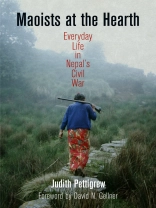The Maoist insurgency in Nepal lasted from 1996 to 2006, and at the pinnacle of their armed success the Maoists controlled much of the countryside. Maoists at the Hearth, which is based on ethnographic research that commenced more than a decade before the escalation of the civil war in 2001, explores the daily life in a hill village in central Nepal, during the ’People’s War.’ From the everyday routines before the arrival of the Maoists in the late 1990s through the insurgency and its aftermath, this book examines the changing social relationships among fellow villagers and parties to the conflict.
War is not an interruption that suspends social processes. Life in the village focused as usual on social challenges, interpersonal relationships, and essential duties such as managing agricultural work, running households, and organizing development projects. But as Judith Pettigrew shows, social life, cultural practices, and routine activities are reshaped in uncertain and dangerous circumstances. The book considers how these activities were conducted under dramatically transformed conditions and discusses the challenges (and, sometimes, opportunities) that the villagers confronted.
By considering local spatial arrangements and their adaptation, Pettigrew explores people’s reactions when they lost control of the personal, public, and sacred spaces of the village. A central consideration of Maoists at the Hearth is an exploration of how local social tensions were realized and renegotiated as people supported (and sometimes betrayed) each other and of how villager-Maoist relationships (and to a lesser extent villager-army relationships), which drew on a range of culturally patterned preexisting relationships, were reforged, transformed, or renegotiated in the context of the conflict and its aftermath.
Innehållsförteckning
Foreword
—David N. Gellner
Introduction
Chapter 1. The Village of Kwei Nasa in 1991−92
Chapter 2. No Place to Hide
Chapter 3. Return to Kwei Nasa
Chapter 4. Maoists in the House
Chapter 5. ’Our Government Is the Maoists’
Chapter 6. ’All We Need Is Peace’: The People’s Movement and Its Aftermath
Chapter 7. After Words
Notes
References
Index
Acknowledgments
Om författaren
Judith Pettigrew is Senior Lecturer in the Department of Clinical Therapies and member of the Centre for Peace and Development Studies at the University of Limerick. She is coeditor of Windows into a Revolution: Ethnographies of Maoism in India and Nepal. David N. Gellner is Professor of Social Anthropology and Head of the School of Anthropology and Museum Ethnography at the University of Oxford. He is author of several books, including Rebuilding Buddhism: The Theravada Movement in Twentieth-Century Nepal (with Sarah Le Vine).












